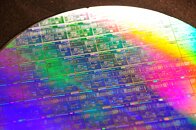T0@st
News Editor
- Joined
- Mar 7, 2023
- Messages
- 2,897 (3.77/day)
- Location
- South East, UK
| System Name | The TPU Typewriter |
|---|---|
| Processor | AMD Ryzen 5 5600 (non-X) |
| Motherboard | GIGABYTE B550M DS3H Micro ATX |
| Cooling | DeepCool AS500 |
| Memory | Kingston Fury Renegade RGB 32 GB (2 x 16 GB) DDR4-3600 CL16 |
| Video Card(s) | PowerColor Radeon RX 7800 XT 16 GB Hellhound OC |
| Storage | Samsung 980 Pro 1 TB M.2-2280 PCIe 4.0 X4 NVME SSD |
| Display(s) | Lenovo Legion Y27q-20 27" QHD IPS monitor |
| Case | GameMax Spark M-ATX (re-badged Jonsbo D30) |
| Audio Device(s) | FiiO K7 Desktop DAC/Amp + Philips Fidelio X3 headphones, or ARTTI T10 Planar IEMs |
| Power Supply | ADATA XPG CORE Reactor 650 W 80+ Gold ATX |
| Mouse | Roccat Kone Pro Air |
| Keyboard | Cooler Master MasterKeys Pro L |
| Software | Windows 10 64-bit Home Edition |
Taiwan's Economic Daily reckons that a freshly formed partnership between TSMC, Broadcom, and NVIDIA will result in the development of cutting-edge silicon photonics. The likes of IBM, Intel and various academic institutes are already deep into their own research and development processes, but the alleged new alliance is said to focus on advancing AI computer hardware. The report cites a significant allocation of—roughly 200—TSMC staffers onto R&D involving the integration of silicon photonic technologies into high performance computing (HPC) solutions. They are very likely hoping that the usage of optical interconnects (on a silicon medium) will result in greater data transfer rates between and within microchips. Other benefits include longer transmission distances and a lower consumption of power.
TSMC vice president Yu Zhenhua has placed emphasis on innovation, in a similar fashion to his boss, within the development process (industry-wide): "If we can provide a good silicon photonics integrated system, we can solve the two key issues of energy efficiency and AI computing power. This will be a new one...Paradigm shift. We may be at the beginning of a new era." The firm is facing unprecedented demand from its clients—it hopes to further expand its advanced chip packaging capacity to address these issues by late 2024. A shift away from the limitations of "conventional electric" data transmissions could bring next generation AI compute GPUs onto the market by 2025.

View at TechPowerUp Main Site | Source
TSMC vice president Yu Zhenhua has placed emphasis on innovation, in a similar fashion to his boss, within the development process (industry-wide): "If we can provide a good silicon photonics integrated system, we can solve the two key issues of energy efficiency and AI computing power. This will be a new one...Paradigm shift. We may be at the beginning of a new era." The firm is facing unprecedented demand from its clients—it hopes to further expand its advanced chip packaging capacity to address these issues by late 2024. A shift away from the limitations of "conventional electric" data transmissions could bring next generation AI compute GPUs onto the market by 2025.

View at TechPowerUp Main Site | Source


